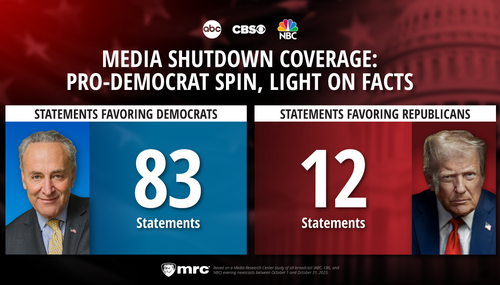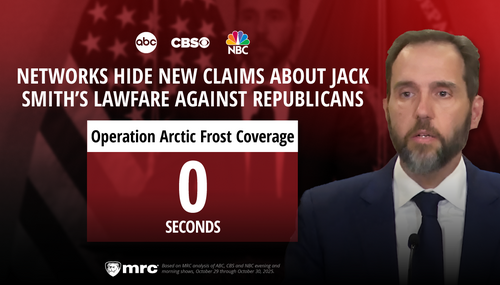George Stephanopoulos on Wednesday again focused on GOP reaction to the Ground Zero mosque, challenging Karl Rove as to whether Republicans such as Newt Gingrich will "undercut the work" President Obama has been doing to reach out to moderate Muslims.
Stephanopoulos highlighted Republican officials "who worry that the kind of rhetoric we've been hearing from people like Newt Gingrich is going to undercut the work that President Bush did and President Obama has tried to do to reach out to the moderate Muslim world." [MP3 audio here.]
He quizzed Rove, "Are you worried about that?" At no time did Stephanopoulos discuss Obama's handling or the rightness of building so close to Ground Zero.
At one point, Rove retorted by bringing up the GMA host's past as a Democratic operative: "You were there, George. In every instance, did you have to go there and say, 'Mr. Clinton, you need to get involved in every single issue that's popping up on the radar scope?'"
It was soon after this remark that Stephanopoulos closed out the segment by trying to refocus the mosque issue on GOP reaction: "But, as you said, you did say right at the top, you're concerned that some Republicans may take this too far, as well."
In an odd moment early in the interview, Stephanopoulos attempted to obtain a partisan disclaimer from Rove. He insisted, "And I know you're a loyal Republican. But put on your objective political strategist hat for just a second. Is the President right to be out there?"
Aside from the irony of a former top Clinton aide telling a former top Bush aide to be objective, Stephanopoulos also failed to do the same thing when he interviewed ex-Democratic Congressman Harold Ford Jr. on Tuesday.
In fact, he did the opposite, asking Ford, "Put the campaign hat back on. How do you run as a Democrat in this environment?"
A transcript of the August 18 segment, which aired at 7:15am EDT, follows:
GEORGE STEPHANOPOULOS: President Obama is in the final day of a campaign swing to help Democratic candidates facing tough contests in November before heading off on a vacation where he says he will charge his batteries. In Seattle, Tuesday, the President charged up the crowd.
BARACK OBAMA: You remember our slogan during the campaign, yes, we can? Their slogan is, no, we can't. No, we can't. Hmm. It's really inspiring.
STEPHANOPOULOS: The crowd loved the sarcasm. But will that argument work for Democrats? Is the President the right person to be delivering it right now? Is there anything he can do to beat back a Republican wave come November? Joining us now is Karl Rove. He was, of course, a top advisor to George W. Bush, now a Fox News contributor, and author of the memoir Courage and Consequence. Good morning, Mr. Rove. Thanks for being with us. And I know you're a loyal Republican. But put on your objective political strategist hat for just a second. Is the President right to be out there? And is this the right message for him?
KARL ROVE: Well, he's right to be out there raising money for Democrats. That's how he can help them. But he's wrong to be out there with this, sort of, unpresidential sarcasm and attempting to be the messenger for the Democrats. Parties lose seats in Congress when the approval is low 50 percent. His approval rating in the latest Gallup is in the low 40s. This portends a huge wave for the Republicans in the fall. And he doesn't make it better for Democrats by constantly being on the stage and by attempting to set the tone for the fall, particularly with this kind of, sort of, sarcastic and negative tone.
STEPHANOPOULOS: By this time in 2006, of course, that was a tough election for Republicans. Democrats took over control of Congress. You were in the White House. Did you know that the election was gone?
ROVE: No. And remember, the elections- the 2006 election was settled by a relatively small number of votes in a small number of contests. The Republicans lost control of the Senate, for example, by 3,500 some odd votes in Montana. You take the 15 closest races that determined the difference between a Republican majority and a Democrat majority and they were settled out of 82 million votes cast. They were settled by a cumulative margin between the winning Republican and the losing Democrat of about 27,022 votes. So, this election itself could be very close. We're going to find a number of contests settled by a small number of votes, with huge consequences for the political outlook of the country.
STEPHANOPOULOS: So- When you look at it, what could prevent the Republicans from taking over, especially the House? I now the Democrats- One thing that Democrats are banking on, this is on the Senate side, is that some of the candidates that they call more extreme, like Rand Paul and Sharron Angle in Nevada, will cost Republican seats that otherwise they would win.
ROVE: Yeah. Well, first of all, I think they're betting on the wrong thing here. In each instance, they have- in Kentucky, a very liberal candidate who supported stimulus, who supported cap and trade, who supports the Obama deficits, who supported Obama care. And then, of course, in Nevada, you got Harry Reid whose favorables have been stuck in the high 30s or low 40s. And who's only chance of re-election is to take, you know, every dollar in his war chest and to eradicate his Republican opponent. That's not the most charming way to get re-elected. And it's not an easy thing to do.
STEPHANOPOULOS: No. But he's still ahead, at least for right now. Let's turn to the controversy of the week, these plans to build an Islamic center near Ground Zero. You saw the President get pounced on pretty hard over the weekend. But, now, some prominent Republicans are worrying that your party may be taking the criticism too far. Here was Governor Chris Christie of New Jersey just the other day, Republican governor of New Jersey. "I understand acutely the pain and sorrow and upset of the family members who lost loved ones that day at the hands of radical Muslim extremists. But it would be wrong to so overreact to that, that we paint Islam with a radical Muslim extremists that just want to kill Americans because we are Americans." He's been joined by some of your former colleagues in the Bush administration. Michael Gerson, President Bush's speechwriter, James Glassman, who became his top public diplomat, who worry that the kind of rhetoric we've been hearing from people like Newt Gingrich is going to undercut the work that President Bush did and President Obama has tried to do to reach out to the moderate Muslim world. Are you worried about that?
ROVE: Well, I am. But I'm even more worried about what the President himself did. This is why I'm furious about it. Look, I don't want the mosque to be built there. But I understood that this was a local issue to be settled in New York. But it was the President, who on Friday night, at a Iftar dinner at the White House, gave a full-throated endorsement to this, that sounded to everybody who heard the remarks as if he supported the mosque being built, the Islamic center being built at the site that it's sponsors have proposed. And Saturday morning, he comes out and says, "Oh, I have not commented and will never comment on whether it's right to build it there." Now, imagine you're in the Islamic world. On Friday night, you hear that the President has supported the mosque being built there. And on Saturday morning you hear that he's flip flopped and walked away from it.
STEPHANOPOULOS: So, do you fault him for the Friday statement or the Saturday statement?
ROVE: I fault him for both. This was an issue- the President- every President doesn't need- You were there, George. In every instance, did you have to go there and say, "Mr. Clinton, you need to get involved in every single issue that's popping up on the radar scope?" The President was better to have said- signal a tone of respect for Islam on Friday night, without engaging in a controversy in a controversy, a local controversy that he previously avoided. And then after Saturday morning, he says he's going to avoid again. He did real damage to America's standing in the world by this inconsistent and incoherent answer that he gave on Friday night, with a different answer on Saturday morning.
STEPHANOPOULOS: Okay. Thank you. But, as you said, you did say right at the top, you're concerned that some Republicans may take this too far, as well. Karl Rove, thank you for your time this morning.




